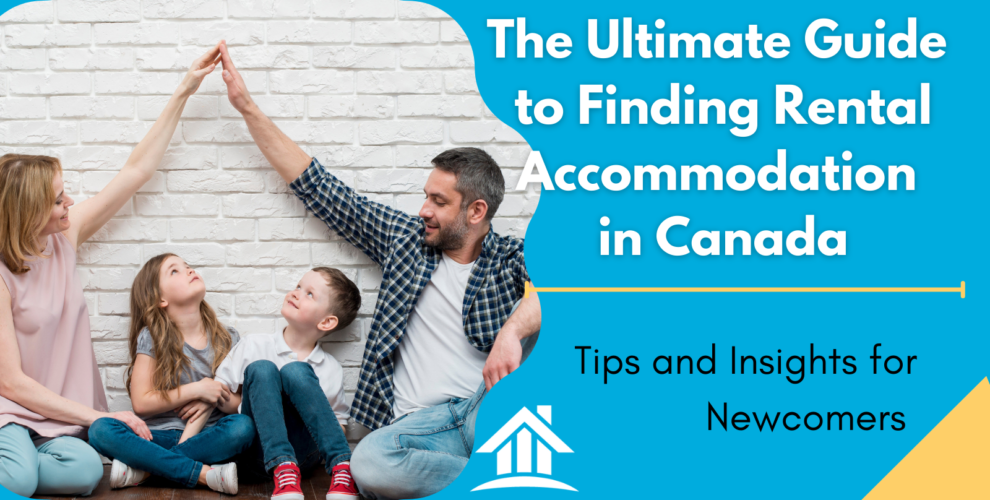Canada, with its stunning landscapes, diverse culture, and renowned quality of life, attracts thousands of immigrants and newcomers every year. In 2024, we are expected to have 485,000 permanent residents moving to Canada. Whether you’re moving to Canada for work, study, or simply seeking a new adventure, finding the right rental accommodation is a crucial step in settling into your new life. From navigating the rental market, learning what landlords are looking for in a tenant to understanding your rights as a tenant, here’s a comprehensive guide to help you navigate the process of finding your ideal rental in Canada.
What are Landlords Looking for in a Tenant
Landlords will require information from prospective tenants prior to renting their home. Some of the information they may want is according to The Ontario Human Rights Commission include:
- Rental history, credit references and/or credit checks
- A lack of rental or credit history should not count against you.
- A landlord can ask you about your income, but they must also look at any available information on your rental history, credit references and credit rating (such as through Equifax Canada).
- Income information can only be considered on its own when no other information is made available, and only to make sure you earn enough to pay the rent.
- Unless you are applying for subsidized housing, it is illegal for landlords to apply a rent-to-income ratio such as a 30% cut-off rule (which means only considering people if the rent is less than 30% of their income).
- Landlords can only ask you for a “guarantor” (someone who promises to pay your rent if you can’t) to sign the lease if they have the same requirements for all tenants.
Before committing to a rental, you should ask your landlord about the rules for the building, home or shared space and anything that might be a deciding factor for you such as transportation or specific facilities such as colleges, universities and work. When you have successfully found the right place, it is crucial to check that all the appliances, locks, faucets, windows, etc, are all working. Refer to our Apartment Viewing Checklist which includes everything you should be aware of before and during the renting process.

Ontario:
In Ontario, websites such as ViewIt, Rent Seeker, PadMapper or realtor.ca are great resources to begin your house-hunting journey. Getting yourself familiar with the rental prices in the area can help you narrow down your options and align them with your budget.
According to the City of Toronto, the average rental prices in 2024 are as follows:
- Studio apartment: $1,427
- 1-bedroom apartment: $1,708
- 2-bedroom apartment: $1,992
- 1-bedroom townhouse: $1,771
- 2-bedroom townhouse: $1,755
The Toronto rental market is very competitive so it’s important to have several backup plans in case your first option doesn’t work out. According to CMHC, the vacancy rate for apartments in Toronto was 1.3% in Q1 of 2023 and 1.7% in Q4. In Ontario, rent cannot increase by more than the guideline set each year, which is 2.5% in 2024. Landlords must provide a written notice of entry at least 24 hours before entering the unit unless it’s an emergency. The notice must contain the reason for entry, day, and time between 8am-8pm.
Tenant Rights and Regulations:
In Ontario, tenants benefit from robust rights and protections under the Residential Tenancies Act (2006). Landlords are required to provide written notice of entry at least 24 hours in advance, except in emergencies. This notice must specify the reason for entry and fall within the designated hours of 8 am to 8 pm. Understanding these regulations empowers tenants to assert their rights and maintain a harmonious landlord-tenant relationship.
British Columbia:
In British Columbia, websites such as Rentals, BC Housing, or Point2Homes are popular platforms.
According to the CMHC 2024 report, the average prices for 2-bedroom rent include:
- Purpose-built: $2,181
- Condo: $2,580
As homeownership costs and international migration increase, renting has been more desired. According to CMHC, the vacancy rate for purpose-built rentals is 0.9% as of January 2024 and the vacancy rate for condos is 0.9%. In the province of British Columbia, the rent increase cannot exceed 3.5% in 2024.
The begin the renting process, landlords are required to submit a Tenancy Agreement Form. If the form is not submitted, tenancies are still protected if they have paid a security deposit. To enter the unit, landlords must provide tenants with a written notice, containing the date, time and purpose, at least 24 hours prior to entering and it must be between 8am-9pm unless both parties agree on another time.
Alberta:
In Alberta, websites such as RentWell, RentFaster, or 4Rent are commonly used.
In Calgary, CMHC states that the average prices for 2-bedroom rent are:
- Purpose-built: $1,398
- Condo: $1,359
As their economic condition has been positive, migration to Calgary has increased, and hence, the demand for rentals has increased compared to 2023. The vacancy rate for purpose-built rentals is 2.4% and the vacancy rate for condos is 2.5% as of January 2024.
Landlord and tenants must be able to enter the unit during the time of occupancy. If the landlord decides to change the lock, a new key must be given to the tenant right away. If a tenant wants to add or change a lock, they must get permission from the landlord and provide them with the new key. Aside from emergencies, landlords must provide a verbal or written notice of entry at least 24 hours beforehand, regardless if the tenant gives permission or not
In Alberta, there is no limit as to how much the landlord can raise the rent. However, they cannot increase the rent until a minimum of one year (365 days) has passed since the start of the tenancy or the last rent increase. If they want to increase the rent, a written notice must be given to the tenant including the date, effective date of the increase, and the landlord’s signature
The notice period varies depending on the period of the tenancy:
- 12 full weeks for week-to-week tenancies
- 3 full months for month-to-month tenancies
- 90 days for other periodic tenancies
Quebec:
In Quebec, websites like duProprio, Louer, or kangalou can be used to research rental prices.
CMHC explains that the average prices of 2-bedroom rent include:
- Purpose-built: $1040
- Condo: $1,317
Due to the return of in-person classes, the number of full-time and international students looking for rentals has increased so the vacancy rate for purpose-built rentals fell to 0.9% and the vacancy rate for condos is 0.9% as of January 2024.

According to the Government of Quebec, before entering a unit, the lessor must provide the tenant with a written or verbal notice at least 24 hours prior, excluding emergencies and it must be between 9am-9pm.
A Calculation 2024 form can be used to calculate a rent increase if the lease started after April 1, 2024. Lessees have the right to accept or refuse the increase within one month of the lessor’s notice.
Finding the right rental accommodation that meets your needs in Canada is a critical aspect of settling into your new life in the country. Understanding the rental market in the area and knowing your priorities is a huge step in looking for the perfect rental. With careful planning and research, you’ll be well on your way to beginning your new adventure in Canada.




